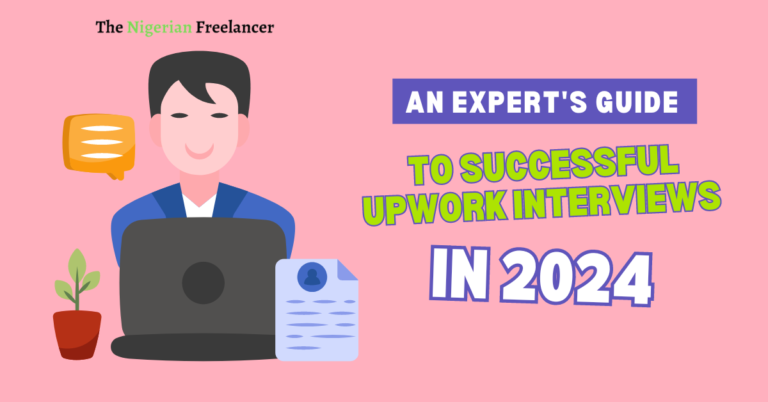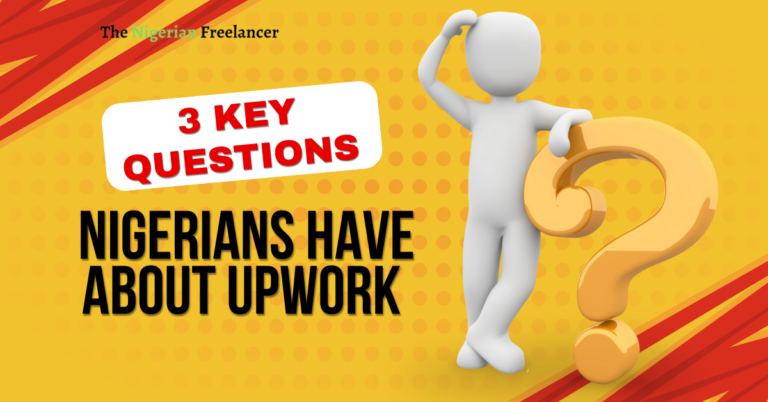Passing through Upwork interviews is one of the core aspects of Upwork, and knowing how to do it properly will go a long way in helping you navigate Upwork successfully.
In this article, I will talk about the Upwork interview process and negotiating your pay with clients.
Why do most Upwork interviews fail?
Hurray! After weeks or months of crafting great proposals, you finally get that lovely reply from a client – believe me, it is a surreal moment that causes deep joy. If you are lucky, it may be the reply that changes your life for the better.
But, unfortunately, the coast isn’t clear yet – the job isn’t yours yet!
From my experience, most of your interviews will probably never lead to jobs — for many reasons. These include:
It is a fake job: Some job posts are fake and you might be interviewed by the client just to scam you even further. Some may even tell you how much they want to work with you only for them to ask you for a short, quick, and free test job; or they might tell you to download a very important company file which might include a virus.
Let me tell you a story:
A client once chatted with me and pretended as if they wanted me to download a company ads report so that I could analyze it for them. The format of the file was strange, but I downloaded it anyway. When I downloaded it, I was lucky that my Adobe Reader repeatedly declined to open it no matter how much I tried. I became skeptical and scrutinized the chats and their identity better, and that was when I identified that this might be a scam after all! I reported the client immediately and moved on.
I have also experienced a situation where I had comprehensive discussions with the client and was only waiting for the contract to be created only for the client to cancel everything at the dying minute.
Sometimes, free test jobs will earn you jobs, but you need to be extremely careful. If the client looks like a spammer or a scammer (check below for my descriptions), don’t bother doing any test job. Be very careful of clicking links that don’t look secure. Finally, be very careful of downloading/installing files carelessly – you may end up getting hacked.
You are just one of those interviewed: At times, clients want to test different applicants to pick; hence, getting interviewed is not an assurance that you will get the job. At times, your skills have little to do with losing out on the job because you are just one of the other freelancers being tested out by the client. The client may have picked someone else because of time zones, location, ethnicity, personal likeness, better skills, etc.
Unsure client: I have been in a situation whereby I was in a comprehensive meeting with a client only to be told that they have decided to cancel the job for the time being. I was incredibly shocked.
Later discoveries: Sometimes, a client may chat you up to see what you have to offer; all of a sudden, they might ask you something like your portfolio, experience, skills, country, etc. and they will simply stop responding. This can be extremely frustrating.
No more needed: A client may have gotten another freelancer to do that job from elsewhere and they will simply stop responding to your messages.
Pricing disagreements: I have lost jobs simply because I asked for higher prices. The most saddening was a certain Singaporean online skills institute where I only had to mark the digital marketing scripts for a continuous time – He offered a price per script, but I asked for something higher. The next thing I saw was that he hired someone else and never responded to date.
The client just wants to pick your brain for free: This happens a lot especially when you are dealing with digital marketing agencies. Many are likely wannabe agencies looking for an experienced freelancer to stylishly pick their brains for free.
You see! These scammers might not tell you to work for free because they know that you will likely RUN when they say that; instead, they stylishly make you work for free before ghosting you after they have picked your brain for free.
Fortunately, some clients will hire you after asking you to do some tasks so that they can evaluate your skills — I got my second Upwork job from such a client. On Upwork, you need to be smart to identify a real opportunity or a fake one; in many cases, the client’s history will expose them for who they truly are!
Tips to Ace Your Interview
Now that you know some of the reasons why your interview might not lead to a job, it is time to learn how to ace a real interview.
- Endeavor to always respond to clients quickly when they reply to your proposal!
- Never do an interview with your mobile phone if you can avoid it; always endeavor to use a good laptop device. At times, the interview will be in the form of Upwork messages; however, the clients may suddenly ask for something that will be difficult to provide with your mobile phone.
- If the interview is via video and your laptop webcam camera is of poor quality, you can use your phone that has a good webcam camera for the interview; but, make sure that your laptop is on and ready to swing to action as needed. If the client asks for a file, you can always send it via the Upwork message.
- If you are doing a video interview on your phone and there is a need for you to share the screen, you can politely explain that you were using your phone and would like to rejoin the video meeting via your laptop. Once permission is granted, join the video meeting via your laptop and switch off the video option — in many cases, the client will likely not bother anymore with seeing your face.
- Always be calm during an interview. You should be bold and ready to prove your expertise whenever you are asked to.
- Don’t make unnecessary jokes with the client!
- If you are not a native English speaker, you don’t need to speak like a native speaker to impress the clients — As long as you don’t have a deeply accented English pronunciation, you are pretty good to go.
- Make sure your English grammar is top-notch — both spoken and written. You might want to study some English before you even start sending proposals.
- When discussing the fees with the clients, always be balanced. Be realistic, and don’t sell yourself too low. When you are discussing your fee, don’t be overreaching as a beginner; don’t try to sell yourself lower also if the client is the type that pays well — check their job history for their payment range. Though, you will probably already know how much they want to pay before the interview.
- Try your best to avoid discussing unnecessary matters — focus on explaining how you can help them with your skills, knowledge, and experience.
- Before the interview, make sure that you close every application or web page that is not related to the interview — you might need to share your screen during the interview.
- Before the interview, get ready to prove yourself to the client. Rehearse your words, and open your portfolio and resume so that you can always check them during the interview.
- When you are asked to talk about yourself, only talk about things that are relevant to the job you are applying to — and DON’T LIE ABOUT YOUR SKILLS.
Negotiating your Pay
Some of the reasons you might need to negotiate your pay include:
Placeholder Budget: At times, the client will only place a budget there without actually knowing the worth of the job that they are advertising. Some do it intentionally, while others don’t. At times, when the client replies to your proposal, they will then initiate a payment negotiation; and at times, it is the freelancer that will initiate a negotiation when he/she sees that the pay is not right for the difficulty of the job.
Added responsibilities: At times, the client might want you to take on more responsibilities which will bring the need for renegotiation. For example, let’s say you were hired as a digital marketer; then, the client later discovers that you are also a good web designer. The client may hire you to work on their website. If something like this happens, you might want to negotiate for higher pay unless you were already working a highly paid hourly role.
Freelancer Request: Maybe you have worked for a particular client for a long time and you feel the need to ask for higher pay. If you raise the issue of pay rise, the client may be willing to negotiate higher pay for you. In that case, you will need to have good negotiation skills.
Changing the job type: If you were hired in an hourly role and you seem to prefer the fixed monthly/weekly budget, you might want to negotiate your fixed pay if the client is willing to do so.
Reduced responsibilities: this is an unwanted situation for many freelancers, but it does happen. When your responsibility reduces, there will likely be a need to negotiate for lower pay.
These are some of the reasons why you might need to negotiate your pay on Upwork. Now, here are some tips that will assist you in negotiating for better pay.
Be Realistic
On Upwork, you need to be smart when doing things. A very important aspect of smartness is to be realistic. You see, clients can be mean when negotiating pay; I mean, if you are giving a client a difficult time with your payment request, they might simply ghost you and move on to another freelancer who is willing to accept their offer.
Please note that I am not saying that you should accept a ridiculous offer; but, you should also study the client’s history and tone very well before making an offer.
Before you name a price, there are two ways to know the range of what the client pays to other freelancers.
This is where you see the client’s previous hires. You should study this very well – you might even be lucky to see how much the client paid a previous freelancer in the same role that you are being interviewed for.
This is where you get to see the rough average rate that the client pays on hourly rates. Note that this doesn’t apply to fixed rates.
By using these 2 ways, you can have a rough idea of the client’s spending power and willingness.
Explain Gently
When you are negotiating with a client, you need to be able to explain yourself in a gentle way. You need to let the client know the scope of your work and how tough it is. You should let them know what you will do to help them and why they should pay you what you want.
Make Them Feel Understood
Using words like “I understand why you,” “I can relate to,” etc can go a long way in making the client feel understood by you. You should never forget that you should always position yourself as a helper to the client, not as a money grabber.
Know When to Stop
Now, this can be the deciding factor whether the client will hire you or simply stop responding to messages. Believe me, you never want to experience ghosting on Upwork — it is very painful!
Once you have tried many ways and the client still insists, take the job if you can; if not, simply reject the offer. If you don’t have other active jobs, I will advise you not to reject a viable job offer as long as it is not ridiculous; that’s because getting proper jobs is getting more difficult on Upwork and you don’t want to regret it later on.
In fact, if you get the job and you do a great job resulting in great feedback from the client, it can boost your profile massively and pave the way for a much better job.
In short, when negotiating your pay on Upwork, you have to be realistic and gentle but not stupid; likewise, you should know when to stop and not be too forward.
Conclusion
Getting good clients on Upwork isn’t easy, and knowing how to ace interviews and negotiate your pay will help you a lot in your Upwork journey.



